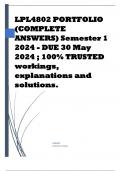LPL4802 PORTFOLIO
(COMPLETE
ANSWERS) Semester 1
2024 - DUE 30 May
2024 ; 100% TRUSTED
workings,
explanations and
solutions.
ADMIN
[COMPANY NAME]
,QUESTION 1: NATURE AND ASSESSMENT OF NON-
PATRIMONIAL LOSS (INJURY TO PERSONALITY) Study the case
on Syce and Another v Minister of Police (1119/2022) [2024] ZASCA
30 and answer the questions below. Your answer must be presented in
an essay format. It will be marked according to the rubric annexed with
this question paper. You must attach the rubric immediately after your
answer, and not at the end of the exam. a) Discuss the law that applies to
unlawful detention in terms of section 59 of the Criminal Procedure Act
51 of 1977, as amended. Provide relevant authority to enlighten your
discussion. (15 marks) b) Explain fully with the aid of authority, the
principles (as highlighted in this case) that the court must follow to
determine general damages in respect of unlawful detention. (10 marks)
[25 marks] Page 5 of 9
Nature and Assessment of Non-Patrimonial Loss (Injury to
Personality): A Case Study on Syce and Another v Minister of
Police (1119/2022) [2024] ZASCA 30
a) Law Applicable to Unlawful Detention under Section 59 of the
Criminal Procedure Act 51 of 1977, as Amended
Unlawful detention is a significant violation of personal freedom and
dignity, safeguarded under South African law by the Constitution and
specific legislative measures. Section 59 of the Criminal Procedure Act
51 of 1977, as amended, provides the framework for the release of
arrested individuals on bail before their first court appearance. However,
its misuse can result in unlawful detention, as highlighted in the Syce
and Another v Minister of Police case.
Legal Framework and Constitutional Protections
The South African Constitution, particularly Section 12, enshrines the
right to freedom and security, ensuring individuals are not deprived of
, their freedom arbitrarily or without just cause. This constitutional
provision forms the bedrock for assessing the legality of detention.
Section 35 further protects the rights of arrested, detained, and accused
persons, mandating that detainees be brought before a court within 48
hours.
Section 59 of the Criminal Procedure Act
Section 59 allows police officers to release an arrested individual on bail
for minor offenses before their first court appearance. This provision
aims to alleviate unnecessary pre-trial detention and ensure that minor
offenders are not unduly held in custody. However, the improper
application of this section can lead to unlawful detention. Authorities,
including the police, must exercise this power judiciously, ensuring
compliance with legal standards and the rights of detainees.
Case Law and Judicial Interpretations
Several cases have elucidated the principles governing unlawful
detention. In Minister of Safety and Security v Tyulu 2009 (5) SA 85
(SCA), the Supreme Court of Appeal emphasized that unlawful
detention, even for a short period, is a severe infringement of personal
liberty. The court underscored the necessity of lawful justification for
detention and adherence to procedural safeguards.
In Mvu v Minister of Safety and Security 2009 (6) SA 82 (GSJ), the
court held that any arrest or detention without a valid warrant,
reasonable suspicion, or statutory authority is unlawful. The case
highlighted that detention must be objectively justified, with the police
bearing the burden of proving its legality.
Syce and Another v Minister of Police
In Syce and Another v Minister of Police, the applicants contended that
their detention was unlawful as the police failed to exercise their
discretion under Section 59 appropriately. The court examined whether





